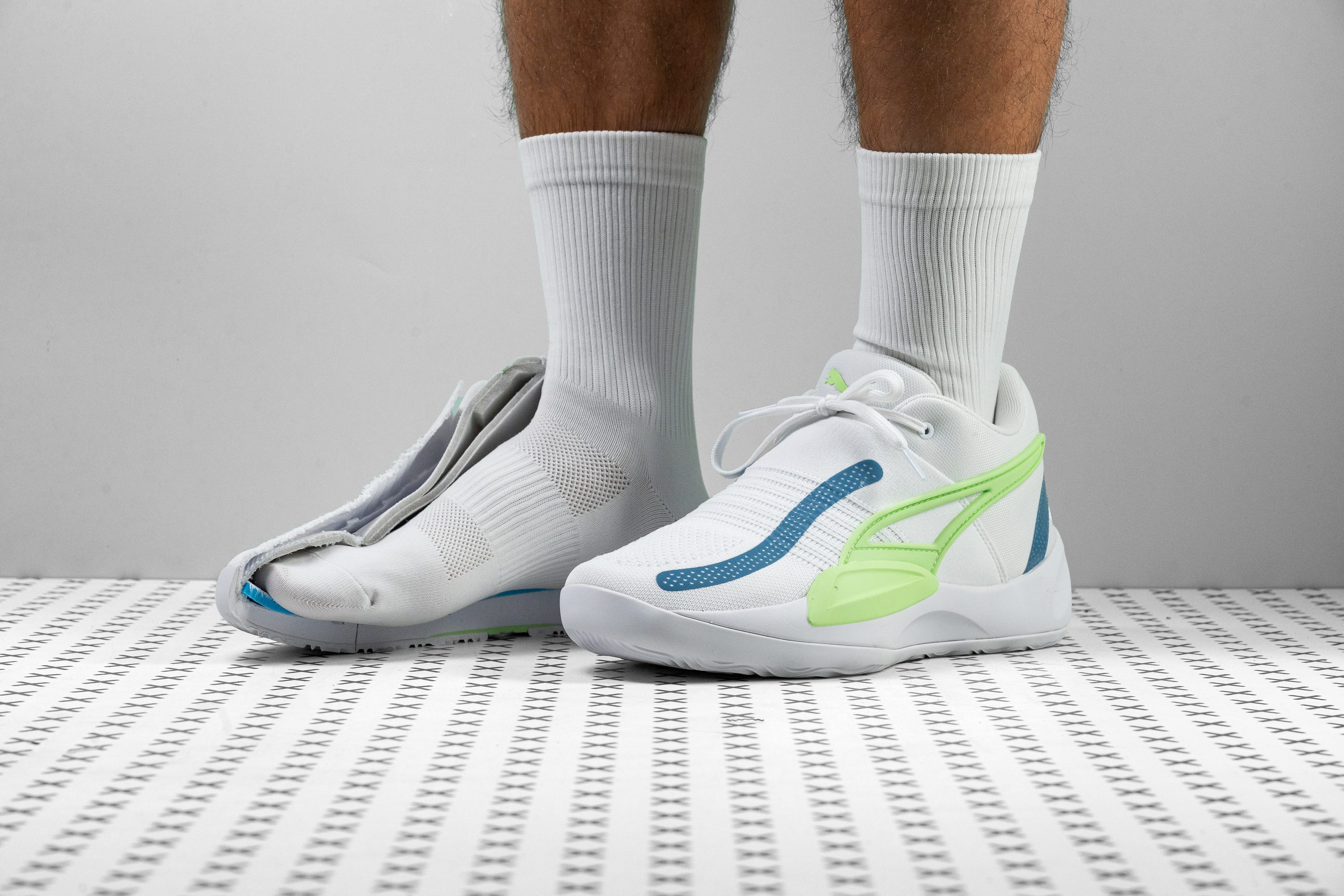Our verdict
- Top pick in best PUMA basketball shoes
Pros
- Great impact protection
- Good court feel
- Very comfortable step-in feel
- Effective grip (on clean courts)
- Breathable upper
- Dependable support and lockdown
- Durable materials
- Futuristic look
- Reasonable price
Cons
- Not for the outdoors
- Dust-sensitive outsole
- Heavier than average
Audience verdict
- Top 4% most popular basketball shoes
Comparison
The most similar basketball shoes compared
+ + Add a shoe | |||||
|---|---|---|---|---|---|
| Audience score | 84 Good! | 89 Great! | 82 Good! | 89 Great! | |
| Price | £130 | £130 | £170 | £170 | |
| Signature | - | LaMelo Ball | - | Allen Iverson | |
| Shock absorption | - | - | Moderate | - | |
| Energy return | - | - | Moderate | - | |
| Traction | - | - | Low | - | |
| Top | Mid | Mid | Mid | Mid | |
| Ankle support | ✓ | ✗ | ✓ | ✓ | |
| Weight lab | 15 oz / 426g | 14.6 oz / 414g | 15.7 oz / 444g | 16.9 oz / 479g | |
| Breathability | Breathable | Moderate | Moderate | Breathable | |
| Outsole durability | - | - | - | Good | |
| Drop lab | 8.1 mm | 6.7 mm | 7.2 mm | 10.3 mm | |
| Heel stack lab | 29.5 mm | 31.6 mm | 27.9 mm | 31.4 mm | |
| Forefoot | 21.4 mm | 24.9 mm | 20.7 mm | 21.1 mm | |
| Size | True to size | True to size | Slightly small | True to size | |
| Midsole softness | Balanced | Balanced | Firm | Firm | |
| Stiffness | Stiff | Stiff | Stiff | Stiff | |
| Torsional rigidity | Moderate | Moderate | Moderate | Moderate | |
| Heel counter stiffness | Flexible | Flexible | Moderate | Flexible | |
| Width / fit | Wide | Wide | Medium | Medium | |
| Toebox width | Wide | Medium | Medium | Medium | |
| Midsole width - forefoot | Average | Narrow | Average | Average | |
| Midsole width - heel | Average | Average | Average | Wide | |
| Heel padding durability | Decent | Decent | Decent | Good | |
| Toebox durability | Decent | Decent | Good | Decent | |
| Insole thickness | Average | Average | Average | ||
| Outsole hardness | Soft | Hard | Hard | Very hard | |
| Outsole thickness | Average | Average | Average | Average | |
| Heel tab | None | None | Finger loop | None | |
| Ranking | #36 Bottom 28% | #13 Top 26% | #47 Bottom 6% | #12 Top 24% | |
| Popularity | #52 Top 4% | #54 Top 8% | #27 Bottom 46% | #31 Bottom 38% |
Who should buy
In our opinion, this basketball shoe from PUMA is a good match for players who:
- usually play indoors, on clean courts
- love a snug, one-to-one fit
- want as hoop shoe that matches their modern style
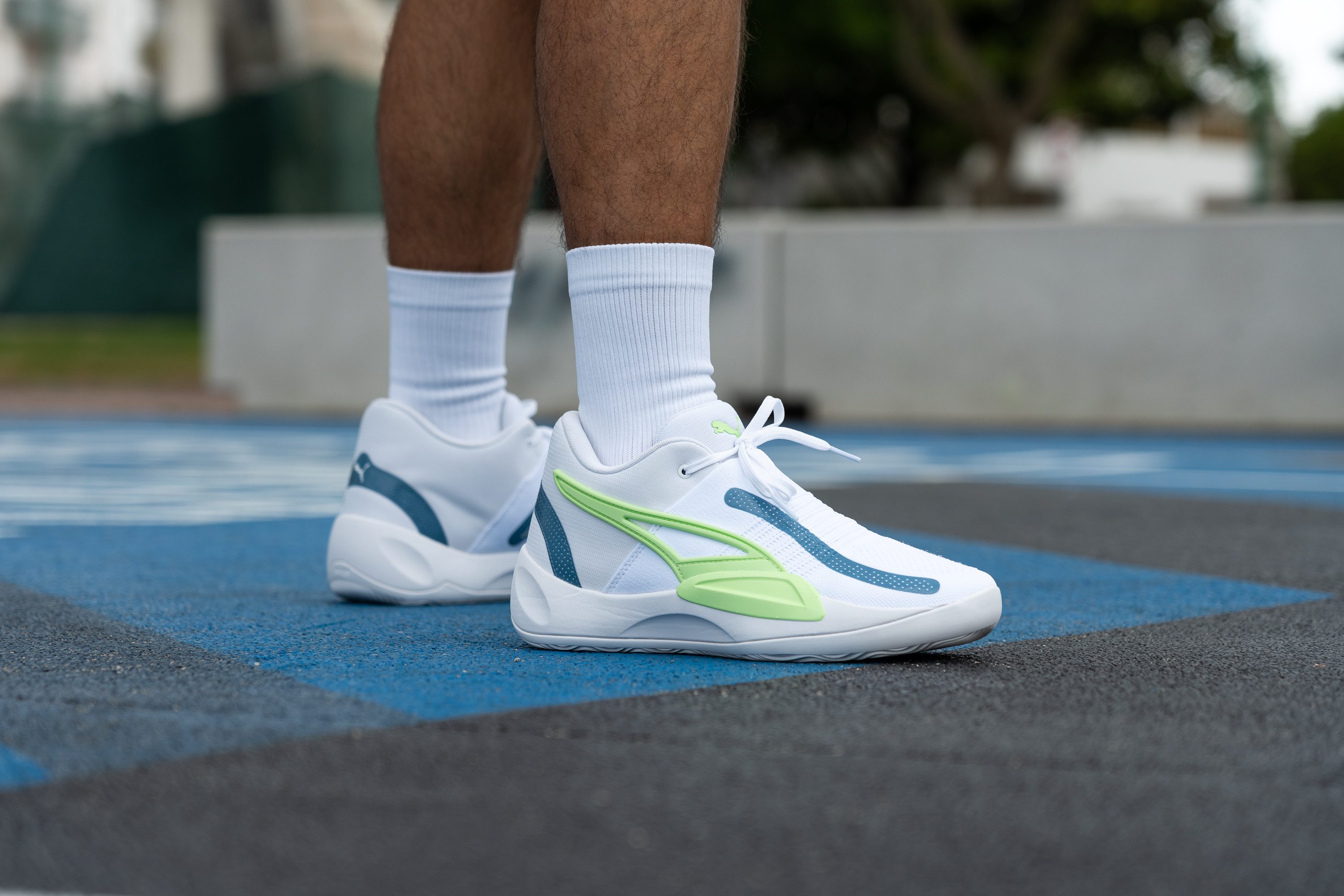
Who should NOT buy
The PUMA Rise Nitro is not for hoopers who are fond of playing on asphalt and other types of outdoor courts because the outsole rubber is way too soft. For that purpose, we recommend the Jordan Zion 2 instead.
And if you are in dire need of dust-resistant outsoles, it is far better for them to get the Adidas D.O.N Issue #4 or the Nike Zoom Freak 4.
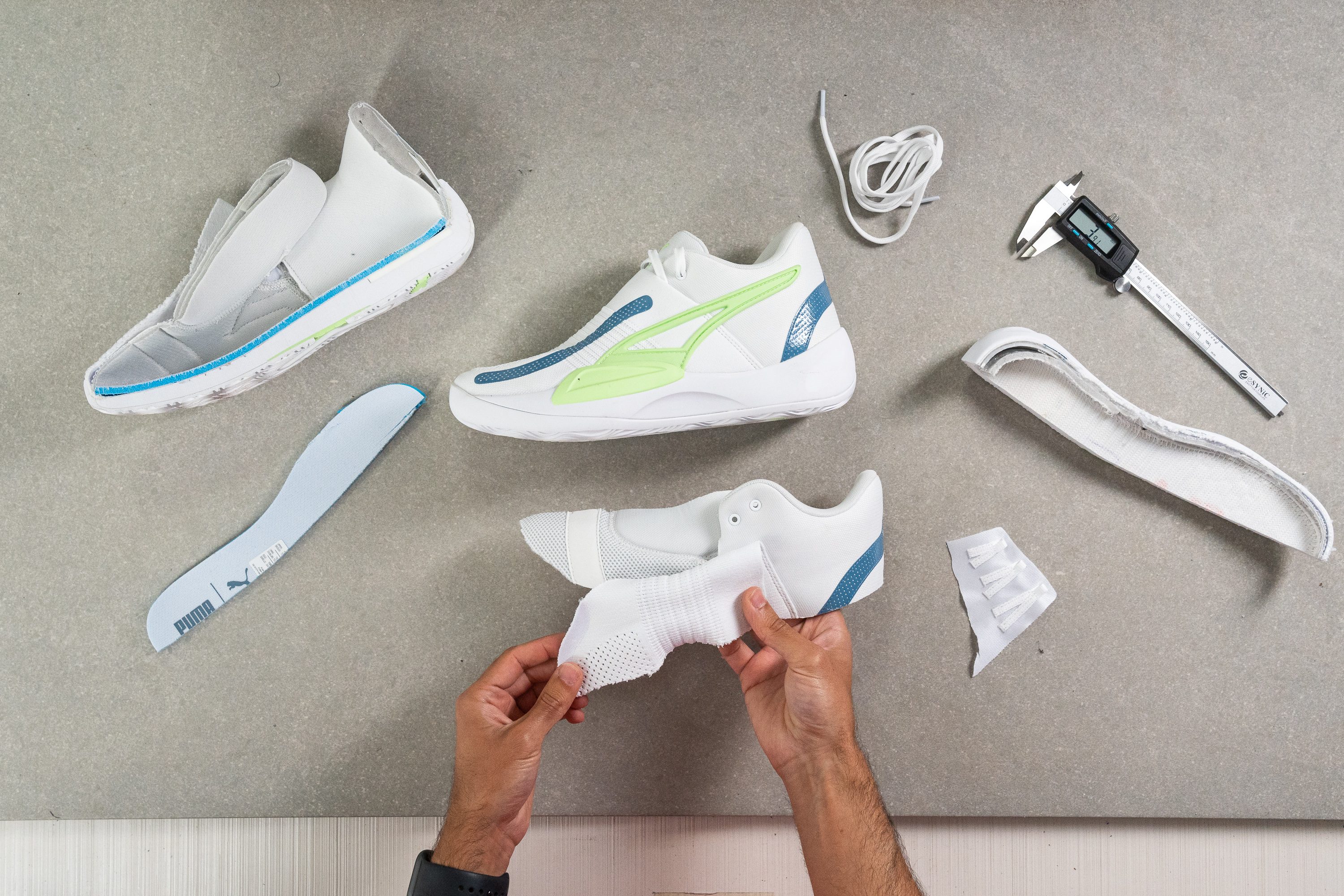
Cushioning
Heel stack
Measuring its stack height with a calliper, we found that the Rise Nitro is 29.5 mm thick in the heel. It's about the same as the average.
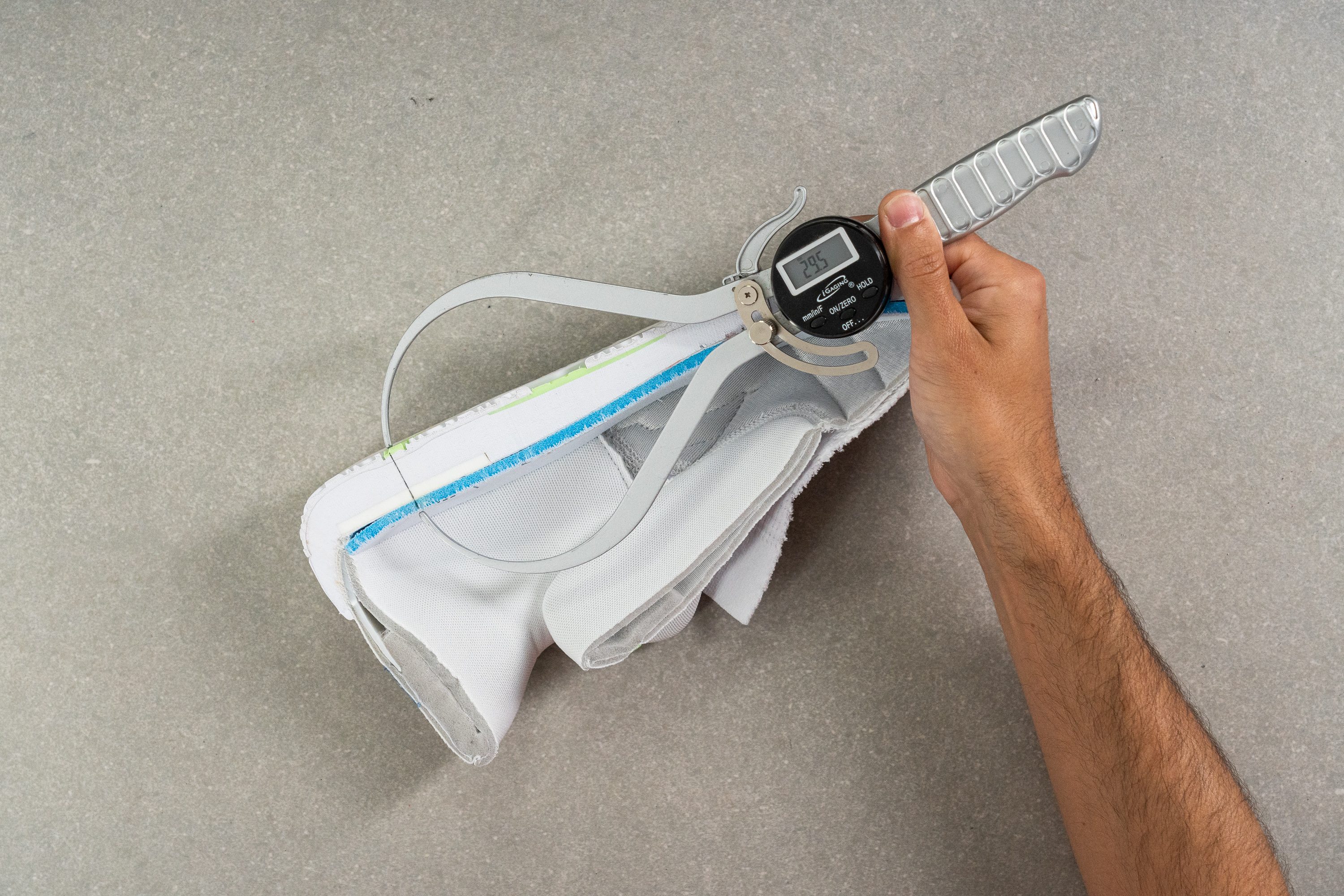
Impact protection is definitely NOT lacking in this PUMA basketball shoe.
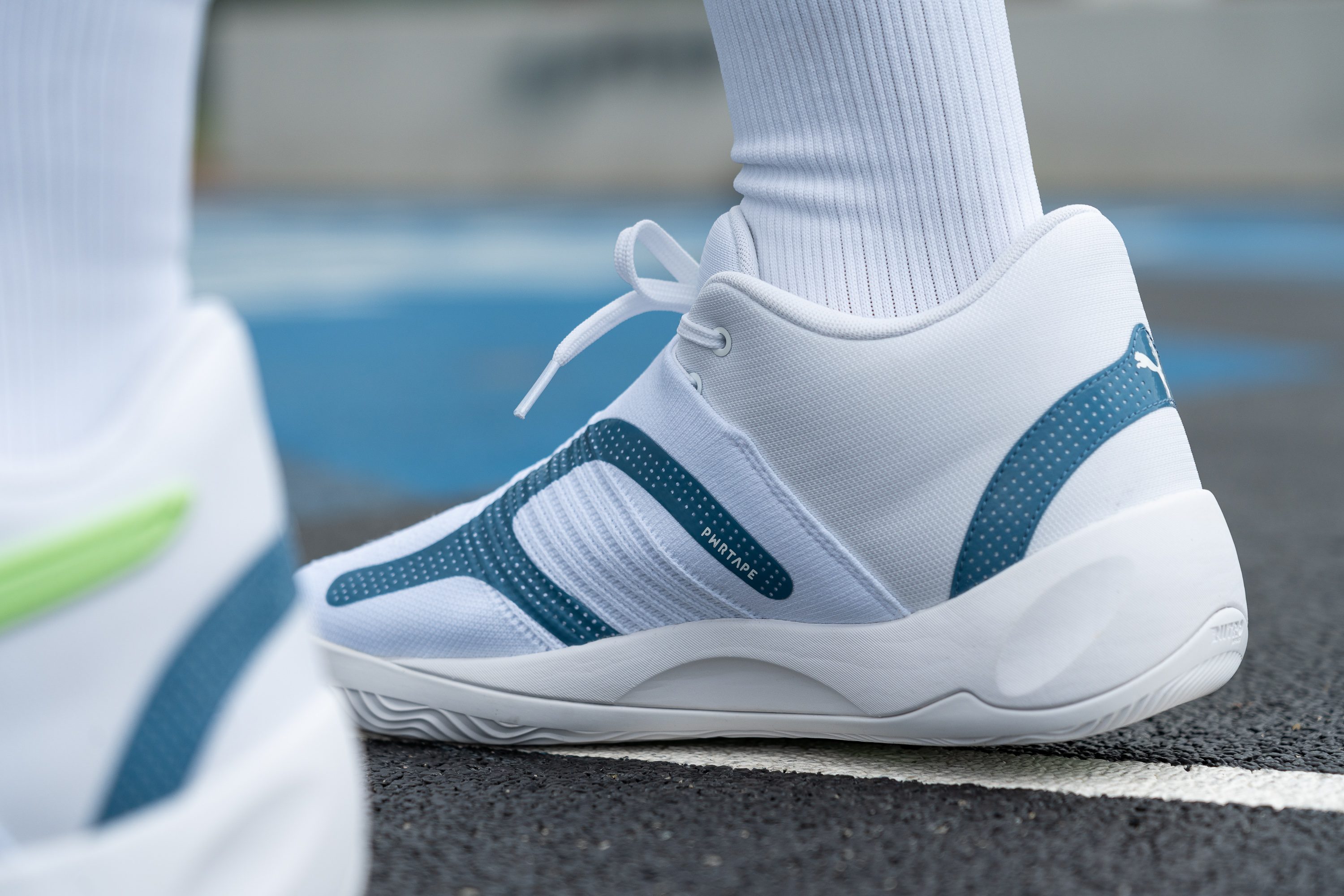
| Rise Nitro | 29.5 mm |
| Average | 28.8 mm |
Forefoot stack
There is also an ample amount of cushioning added under the toes. We measured the shoe's forefoot stack height at 21.4 mm which is the same as the average of our lab-tested hoop shoes.
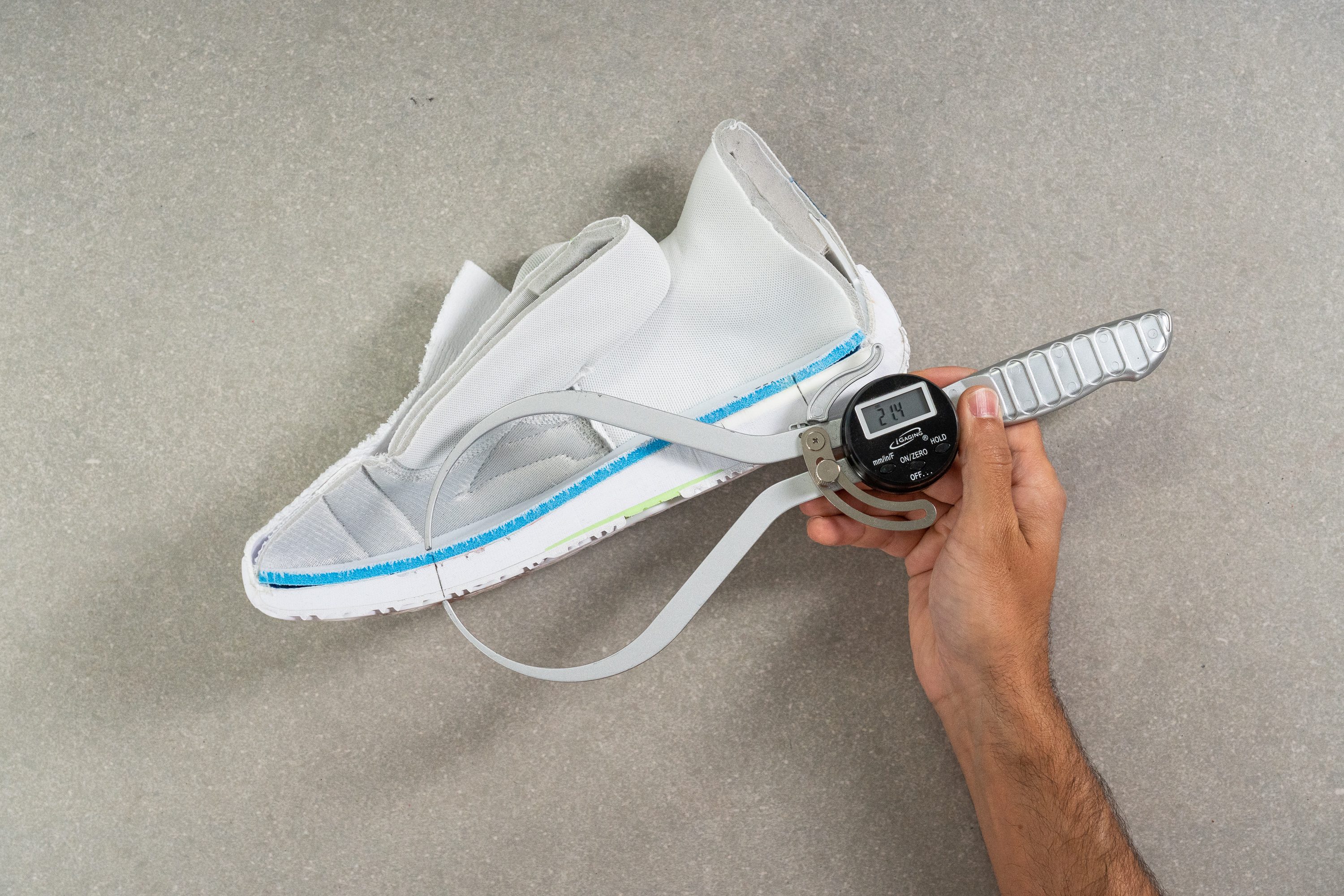
| Rise Nitro | 21.4 mm |
| Average | 21.4 mm |
Drop
The difference in stack heights gave us a heel-to-toe drop of 8.1 mm, which is about a millimetre taller than average.
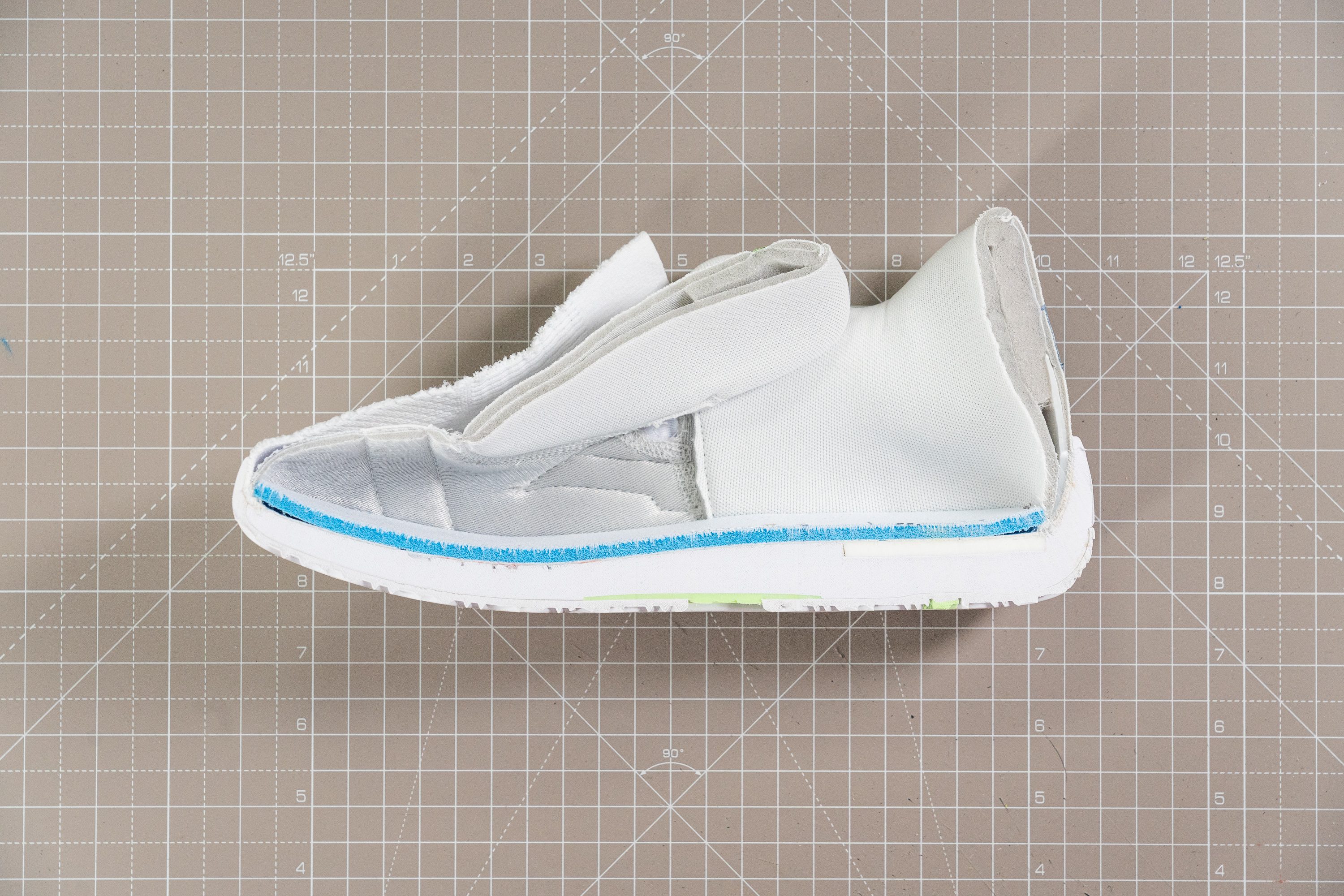
Based on our experience with the shoe, the full-length Nitro foam has a highly efficient shock absorption with a nice touch of court feel.
| Rise Nitro | 8.1 mm |
| Average | 7.4 mm |
Midsole softness
The Rise Nitro offers a pretty comfortable underfoot experience with its Nitro foam. Pressing a durometer against it, we got a reading of 23.1 HA, which is around 20% softer than most shoes.
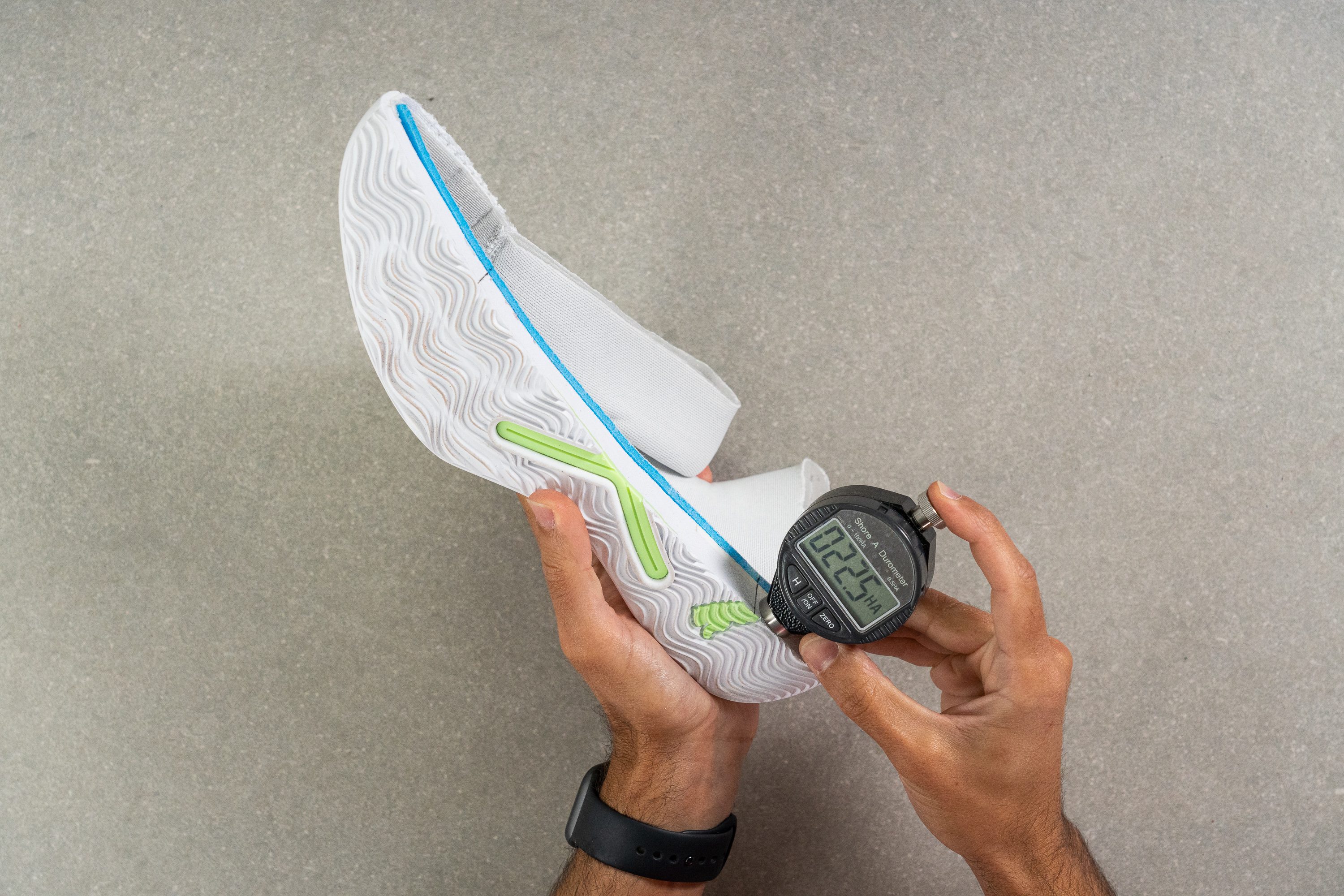
However, this PUMA shoe is not necessarily a plush one as the foam is locked inside a rubber carrier which dampens the softness a bit.
For that reason, the shoe may feel underwhelming. It lacks the fun and bounce you might expect from a shoe of with this much cushioning. But on the bright side, the Rise Nitro made us feel nice and grounded.
| Rise Nitro | 23.1 HA |
| Average | 24.3 HA |
Secondary foam
Under the heel, we found an additional cushioning unit. PUMA doesn't specify what type of foam that is but it is a bit firmer than the primary Nitro foam.
Measuring its softness with a durometer, we found that this component is firmer than the Nitro by 15%. We assume that its purpose is to make heel landings more stable and protected.
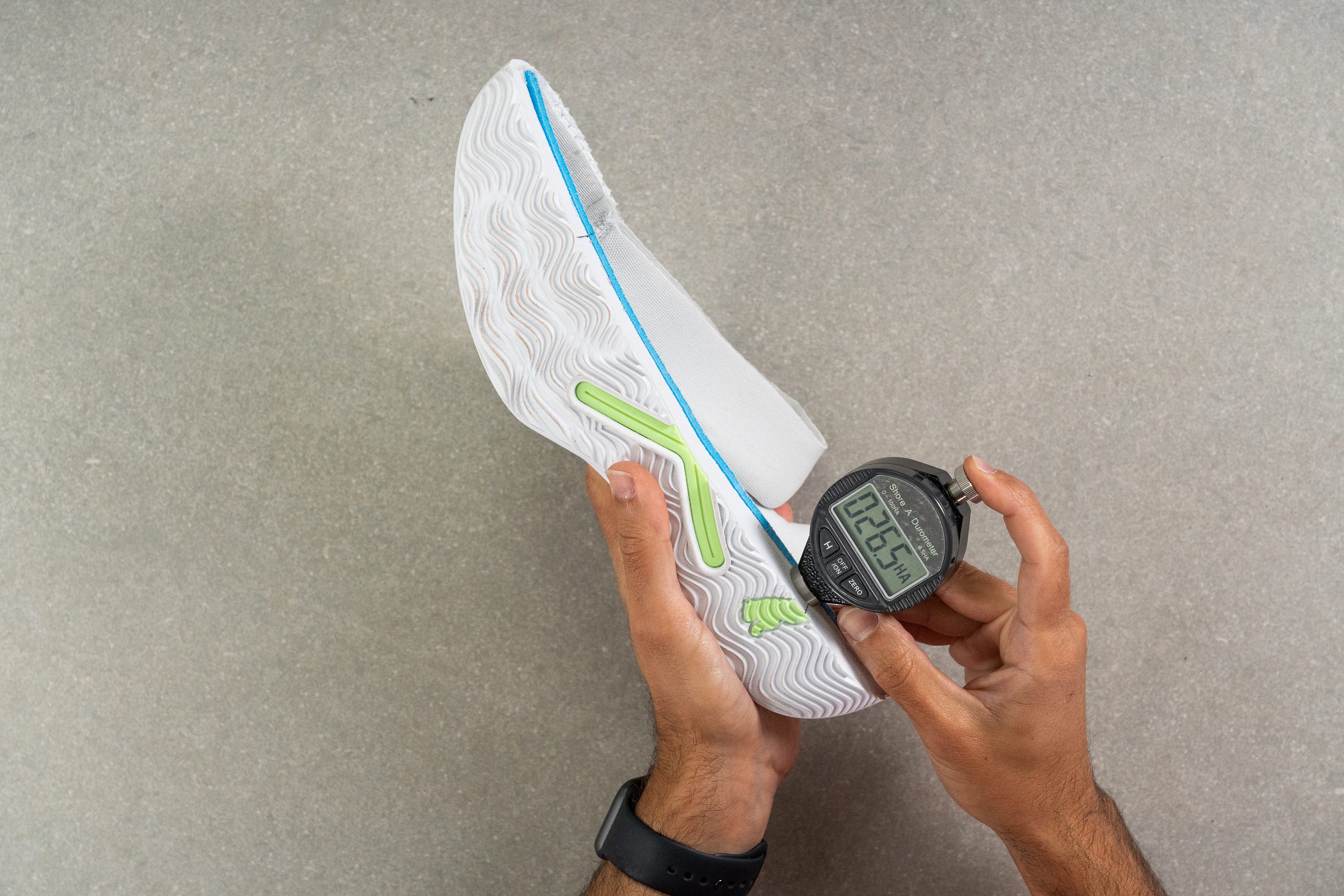
| Rise Nitro | 26.5 HA |
| Average | 27.7 HA |
Size and fit
Size
PUMA Rise Nitro fits true to size (17 votes).
Internal length
| Rise Nitro | 263.2 mm |
| Average | 271.7 mm |
Width / Fit
This basketball shoe from PUMA treated us to a very accurate true-to-size fit which required no size adjustments.
Checking the toebox width in its widest part, our calliper showed 102.1 mm. It's even a couple of millimetres wider than average.
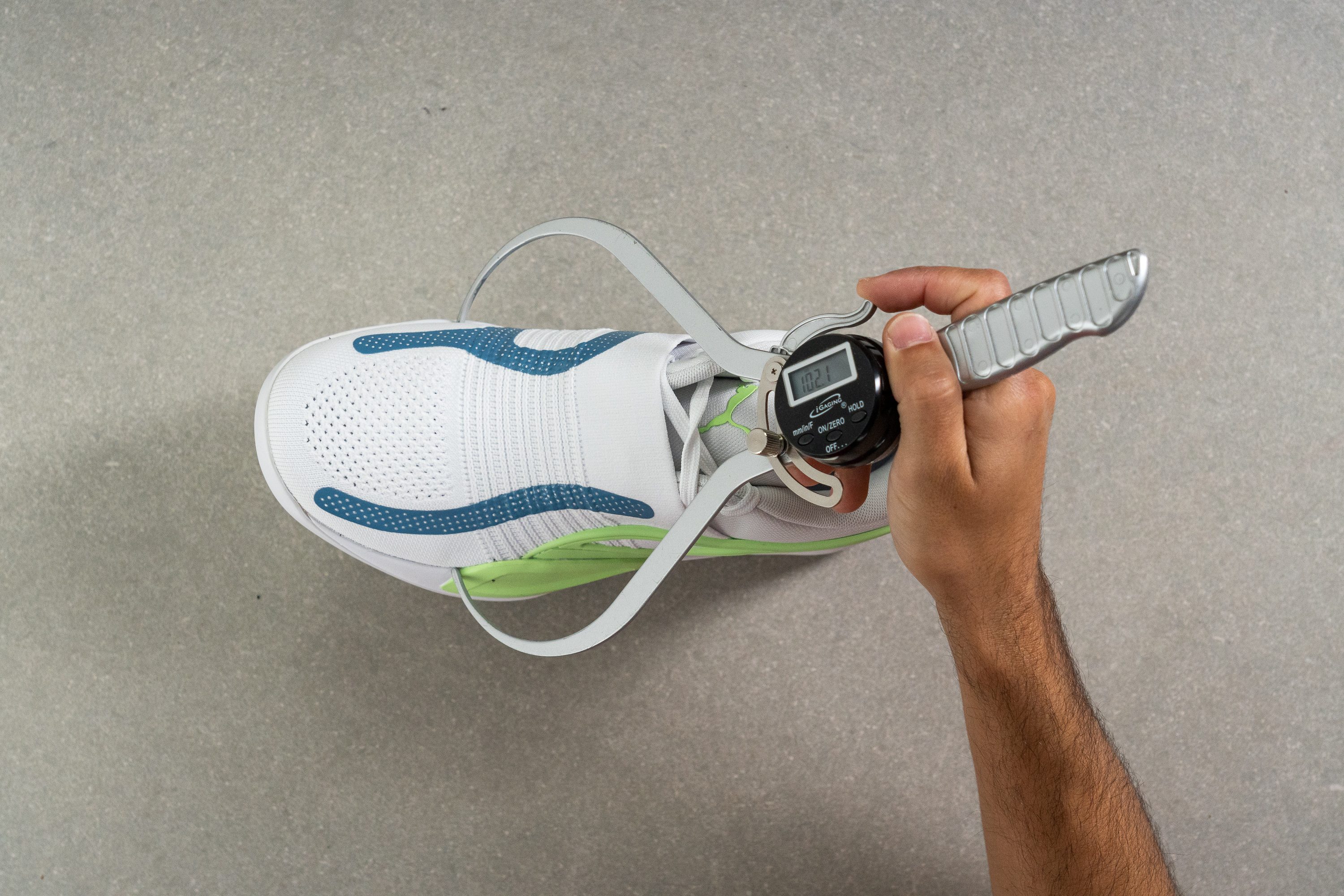
This test follows an older methodology, which is why you don't see recently tested shoes in the chart. Results from different methodologies can not be compared.
| Rise Nitro | 102.1 mm |
| Average | 101.6 mm |
Toebox width
The shoe doesn't lose its roominess towards the toes either. We measured the toebox width around the big toe and found that at 79.4 mm, it is also a couple of millimetres wider than most shoes.
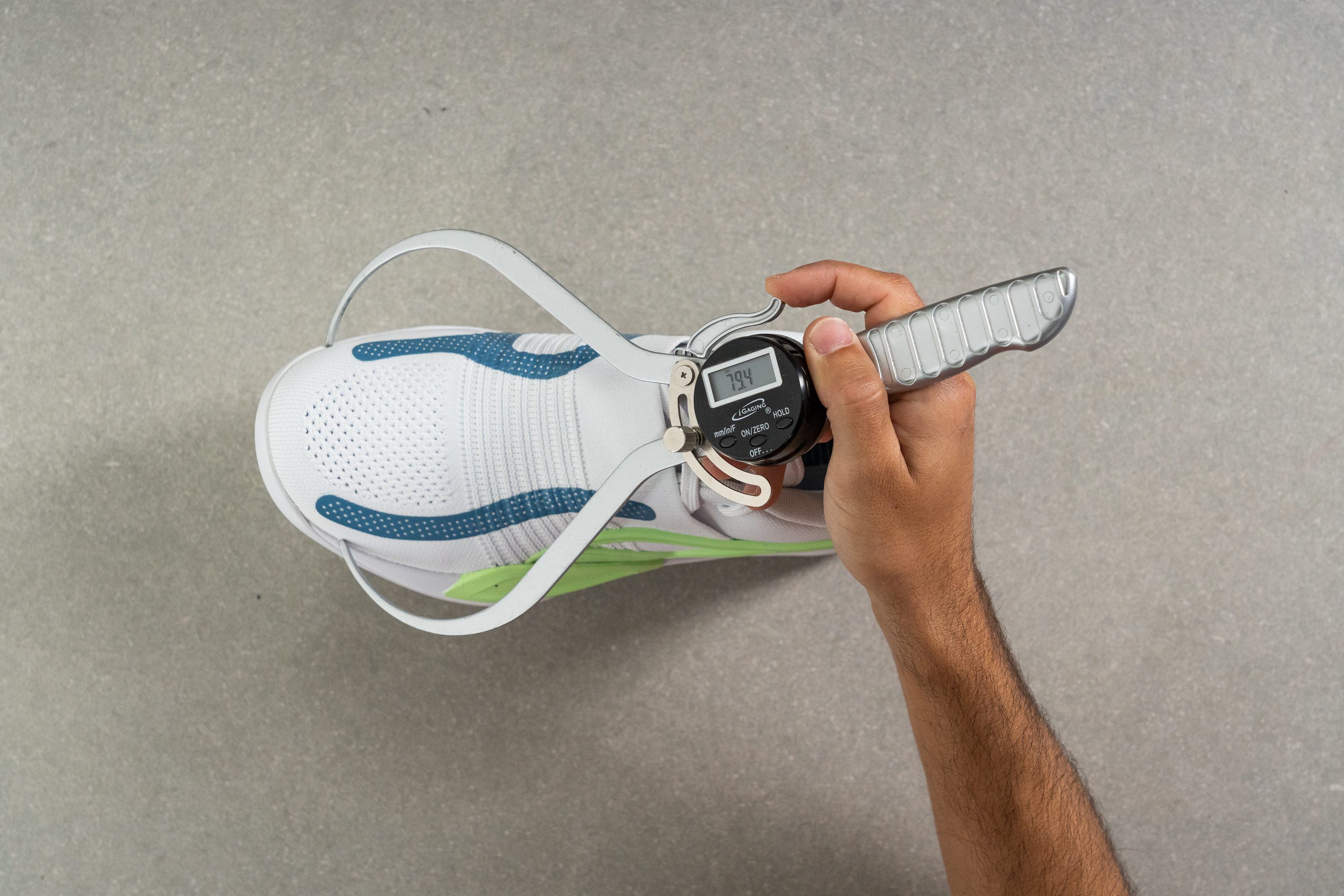
This test follows an older methodology, which is why you don't see recently tested shoes in the chart. Results from different methodologies can not be compared.
| Rise Nitro | 79.4 mm |
| Average | 76.9 mm |
Flexibility / Stiffness
With all that stability packed into the PUMA Rise Nitro, the shoe still remains fairly flexible. Using a force gauge, we measured that it takes 36.6N to bend the shoe to a 90-degree angle. That's 14% less than it takes a basketball shoe on average.
It helps to make the shoe's ride smooth and easy.
This test follows an older methodology, which is why you don't see recently tested shoes in the chart. Results from different methodologies can not be compared.
| Rise Nitro | 36.6N |
| Average | 38.8N |
Weight
Despite its seemingly minimal design, the PUMA Rise Nitro turned out to be heavier than average. We weighed the shoe at 15.0 oz (426g) in a men's US size 9. This is more than an ounce heavier than our lab-tested basketball shoes on average.
It is about the same weight as the Nike Lebron 20!
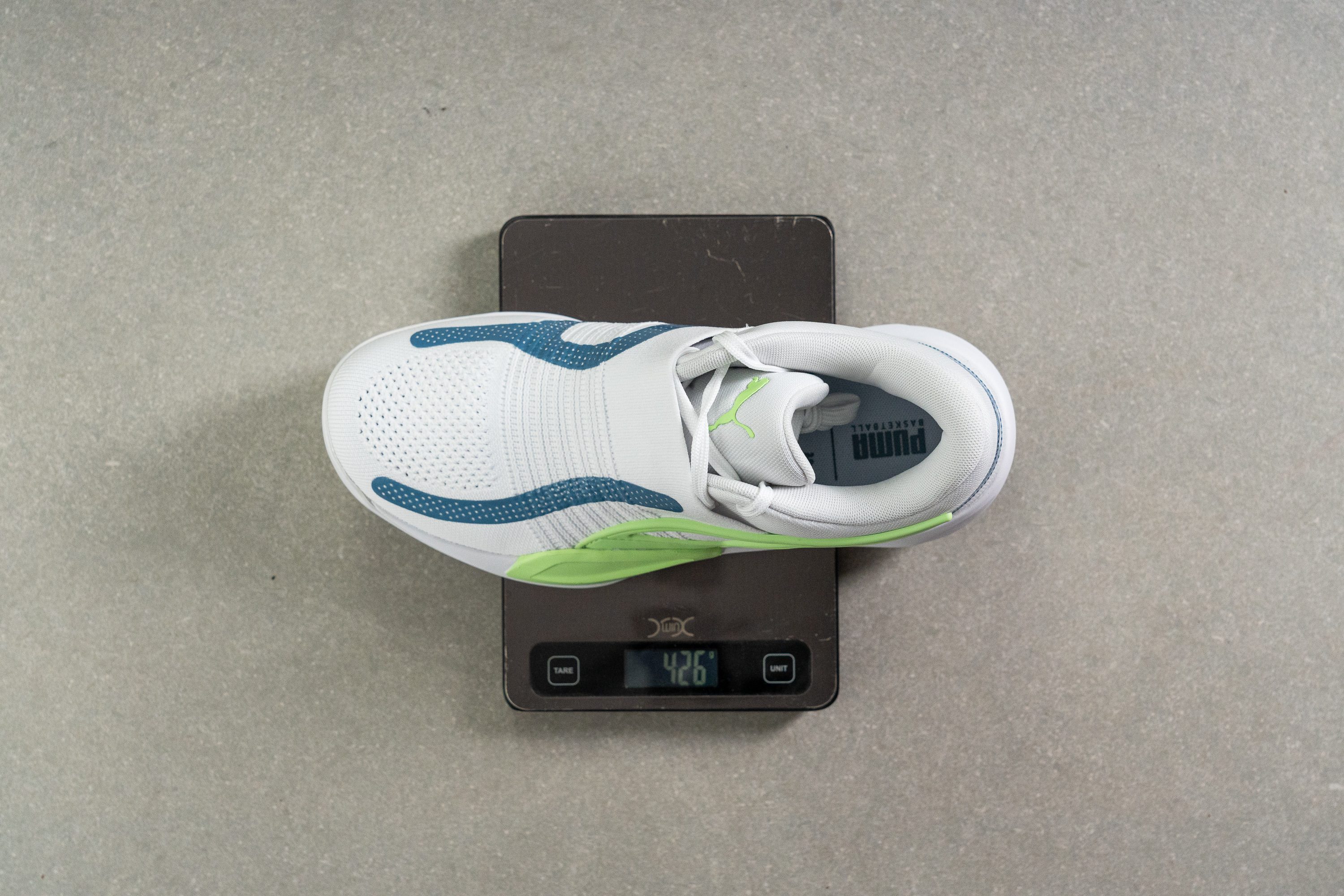
| Rise Nitro | 15.0 oz (426g) |
| Average | 13.8 oz (391g) |
Breathability
The PUMA Rise Nitro is one of those few basketball shoes with an actually breathable upper.
Based on a smoke-pumping test illustrated in the video below, we evaluated the shoe's ventilation capacity as 4 out of 5. This is one of the most aerated shoes in our basketball catalogue.
Perforations in the upper become even more apparent when putting the shoe against a bright light.
Here is a close-up view of the shoe's breathability cells taken through our microscope.
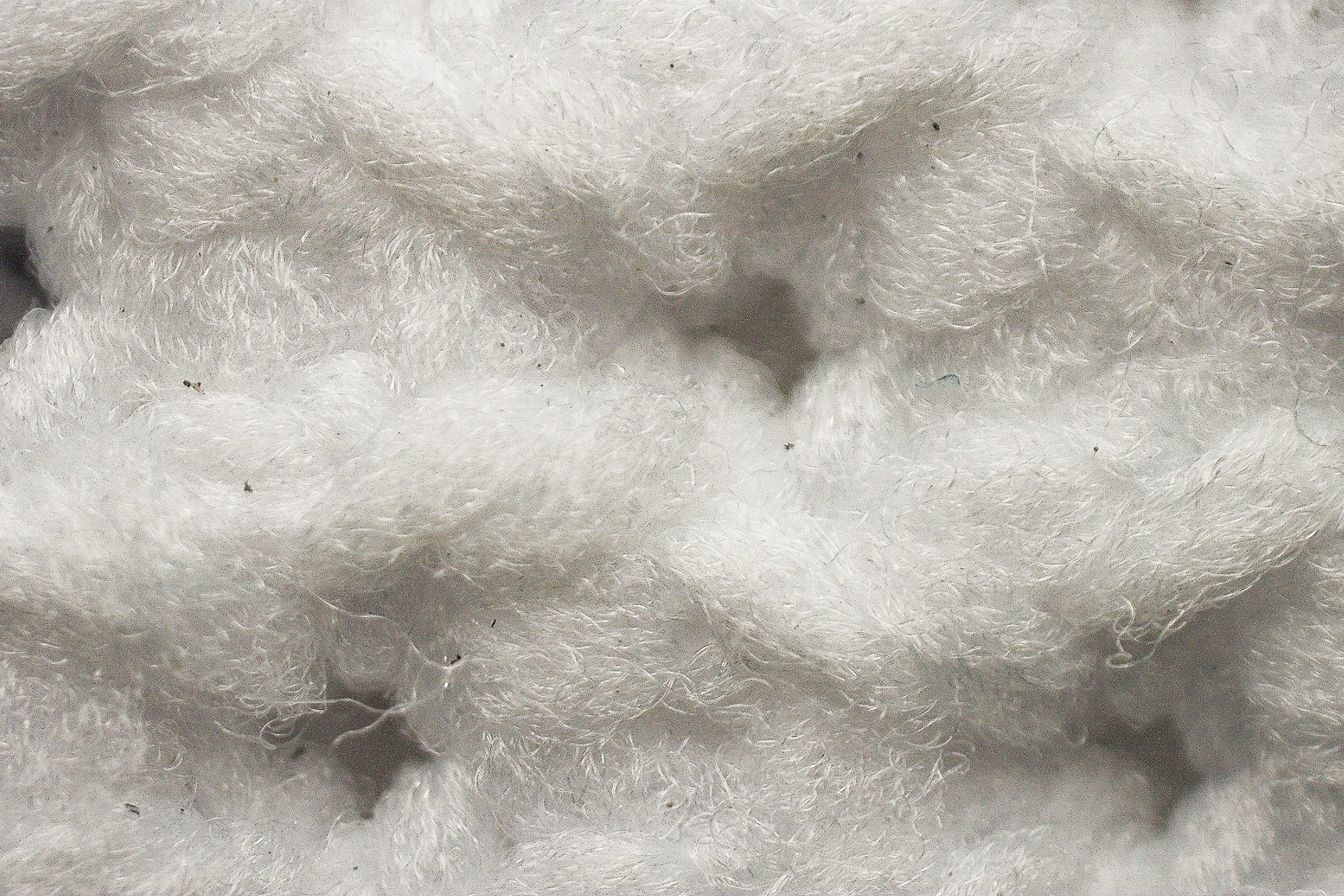
| Rise Nitro | 4 |
| Average | 2.5 |
Stability
Lateral stability test
Stability and lateral containment are exceptionally good in the PUMA Rise Nitro.
The support is coming from the shoe's sturdy base that's enhanced with a shank, the stiff and padded heel counter, and the strategically placed PWRTAPE on the upper. The latter kind of reminded us of athletic taping used on people.
Torsional rigidity
Thanks to the stiff asymmetrical shank embedded into the midsole, there is little-to-no twisting of the PUMA Rise Nitro. On a 1-5 scale where 5 is the stiffest, we rated the shoe as 4.
This is a major stability factor during all those fast and shifty movements.
| Rise Nitro | 4 |
| Average | 4.5 |
Heel counter stiffness
In our manual check of the heel counter, we rated its stiffness as 3 out of 5. It also provided a solid lockdown to keep our heels and ankles steady during the playtest.
Once the shoe was laced up, our feet weren't going anywhere.
| Rise Nitro | 3 |
| Average | 3.8 |
Midsole width - forefoot
To further elevate its stability game, the PUMA Rise Nitro went for an extra-wide platform.
Our calliper shows a notably wider-than-average base in both the heel and the forefoot. The widest part of the forefoot comes in at 119.8 mm which is about 7 mm wider than average!
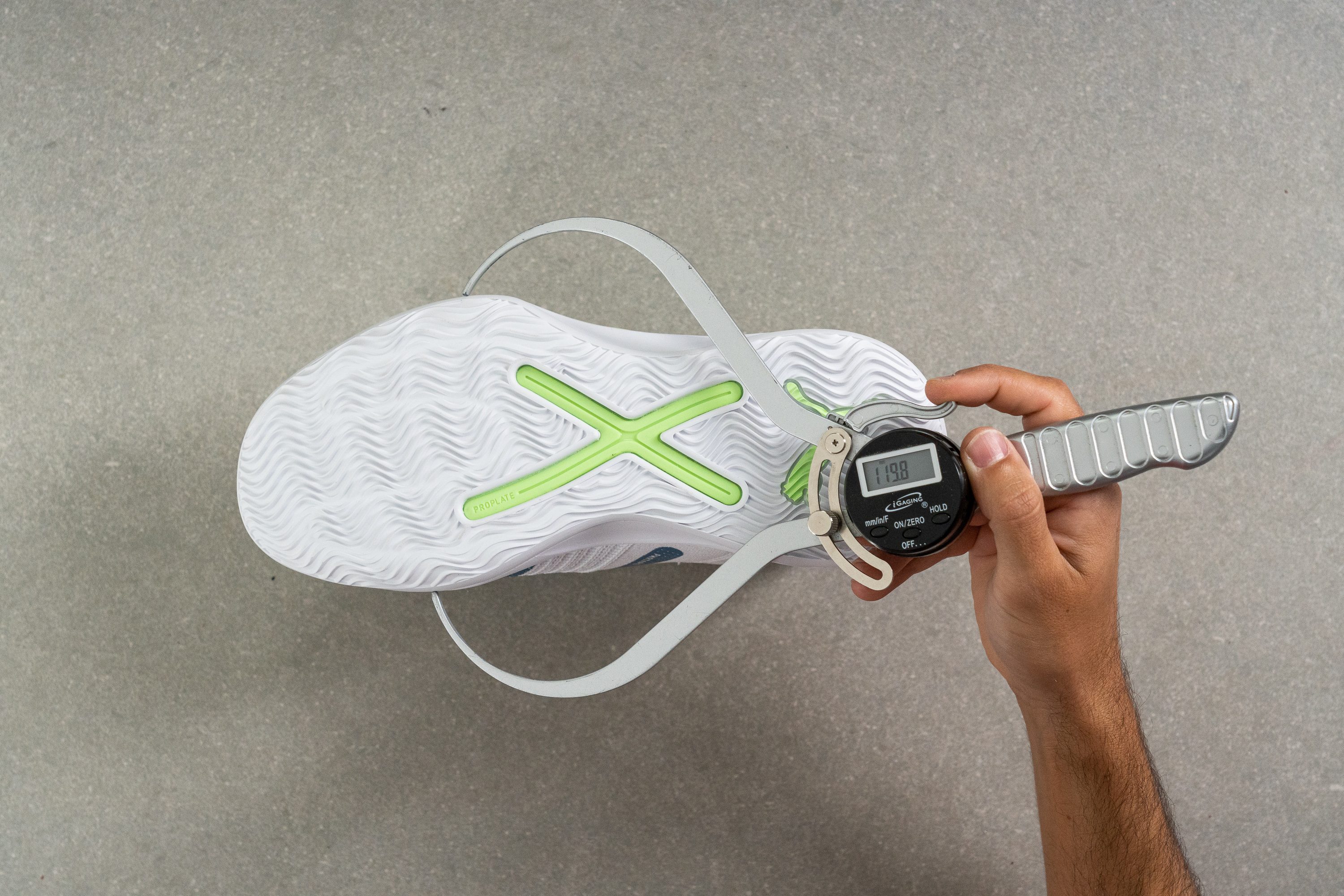
| Rise Nitro | 119.8 mm |
| Average | 114.8 mm |
Midsole width - heel
The same occurs in the heel. In the widest part of the sole, our calliper shows 95.2 mm. This is a good 5 mm wider than average.
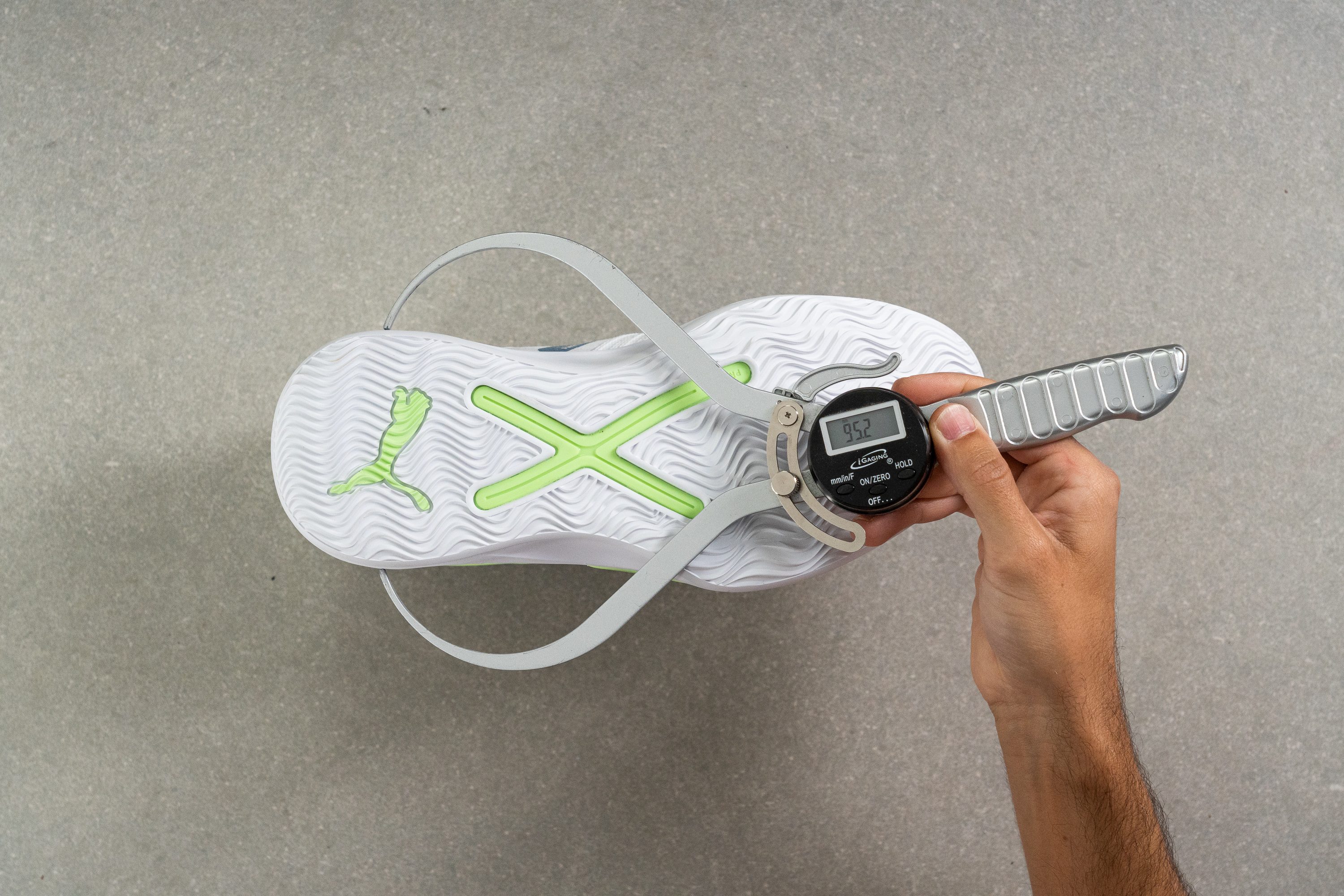
| Rise Nitro | 95.2 mm |
| Average | 89.7 mm |
Durability
Toebox durability
Seeing how soft the knit fabric of the PUMA Rise Nitro is, we never expected it to survive our Dremel test. But the shoe managed to surprise us by heroically withstanding the 12-second torture.
This PUMA shoe ended up with pretty moderate damage whereas the fabric on another shoe was torn completely. Due to its high resistance to abrasion, the Rise Nitro earned a solid 3 out of 5 for toebox durability.
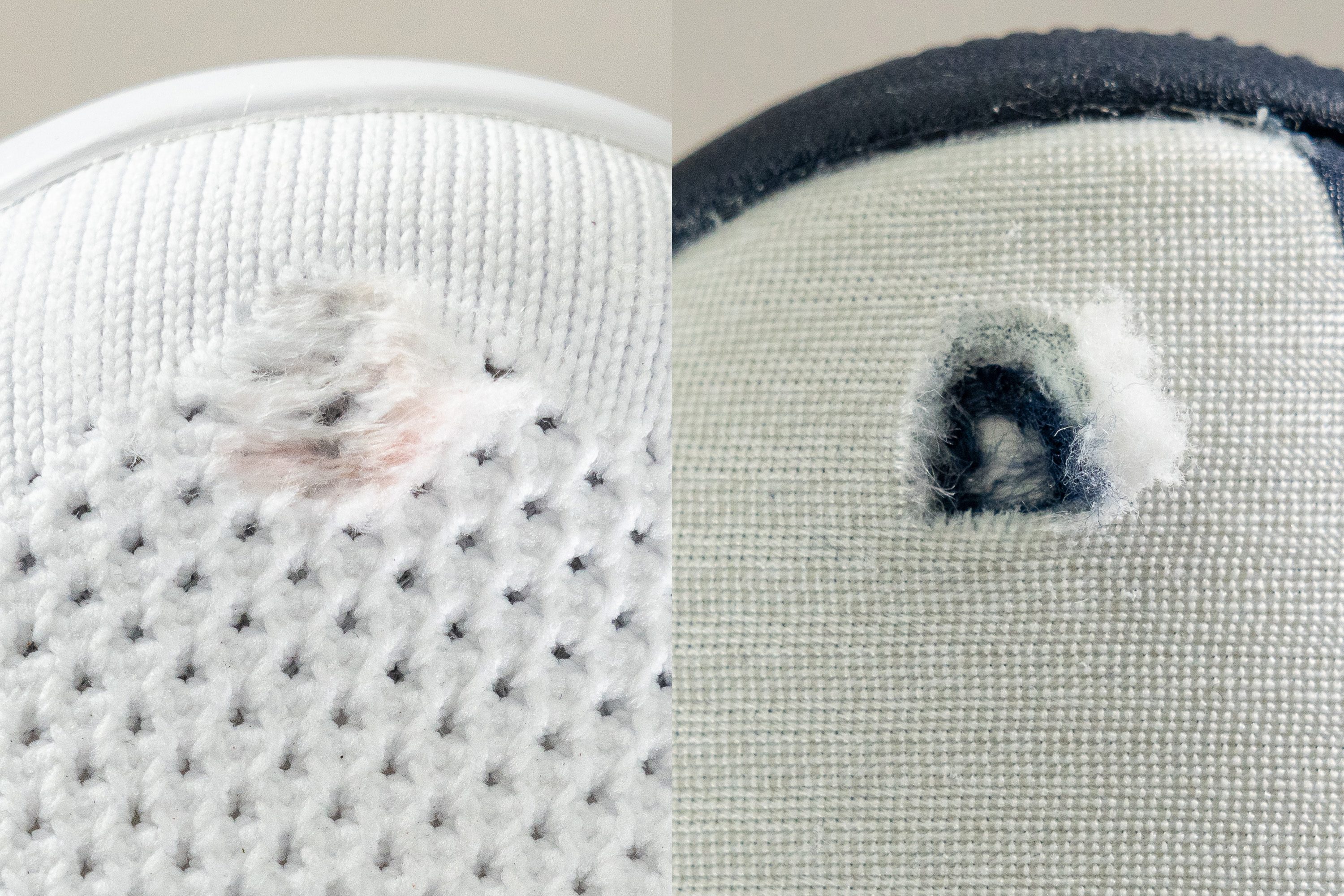
| Rise Nitro | 3 |
| Average | 3.7 |
Heel padding durability
Another pleasant surprise was the shoe's heel padding durability. Given how much rubbing is going on in this part of the shoe, we anticipate that the PUMA Rise Nitro will not break down that easily.
Assessing how much wear and tear the Dremel left on the shoe's heel padding, we rated its durability as 3 out of 5. That's an average result among our lab-tested hoop shoes.
| Rise Nitro | 3 |
| Average | 3.7 |
Outsole hardness
WARNING: This is the softest rubber in the history of basketball shoe rubbers! Stay away from outdoor courts!
We strongly recommend limiting the use of this PUMA shoe to indoors only because the rubber compound that composes the outsole is REALLY soft.
Pressing our durometer against the outsole, we found that it is only hard by 68.4 HC. This is 17% softer than our average lab result!
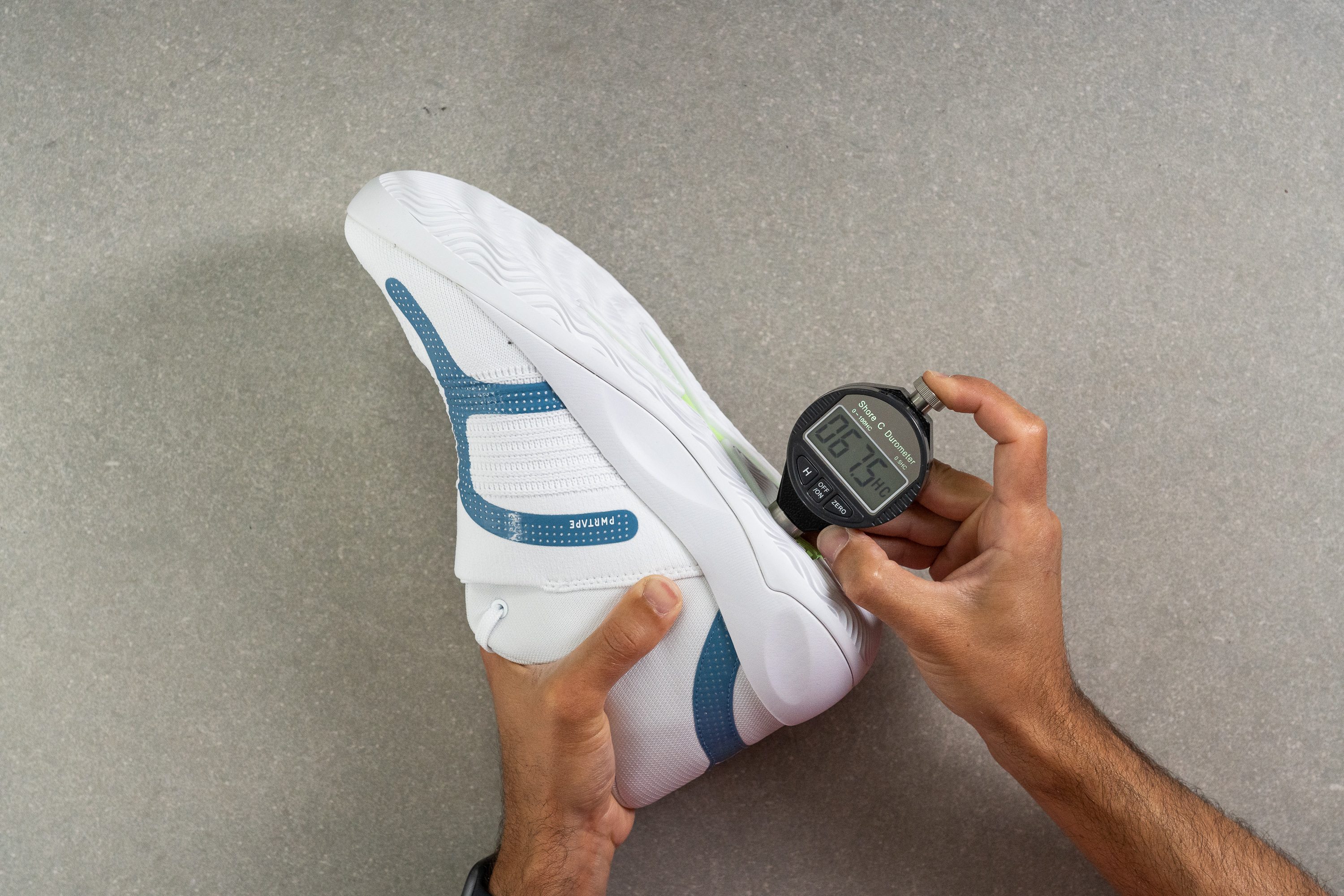
| Rise Nitro | 68.4 HC |
| Average | 81.5 HC |
Outsole thickness
It seems like the brand tried to compensate for the soft rubber by making it thicker than average. Measuring the outsole thickness with a calliper, we got a reading of 4.6 mm. This is nearly a millimetre thicker than average.
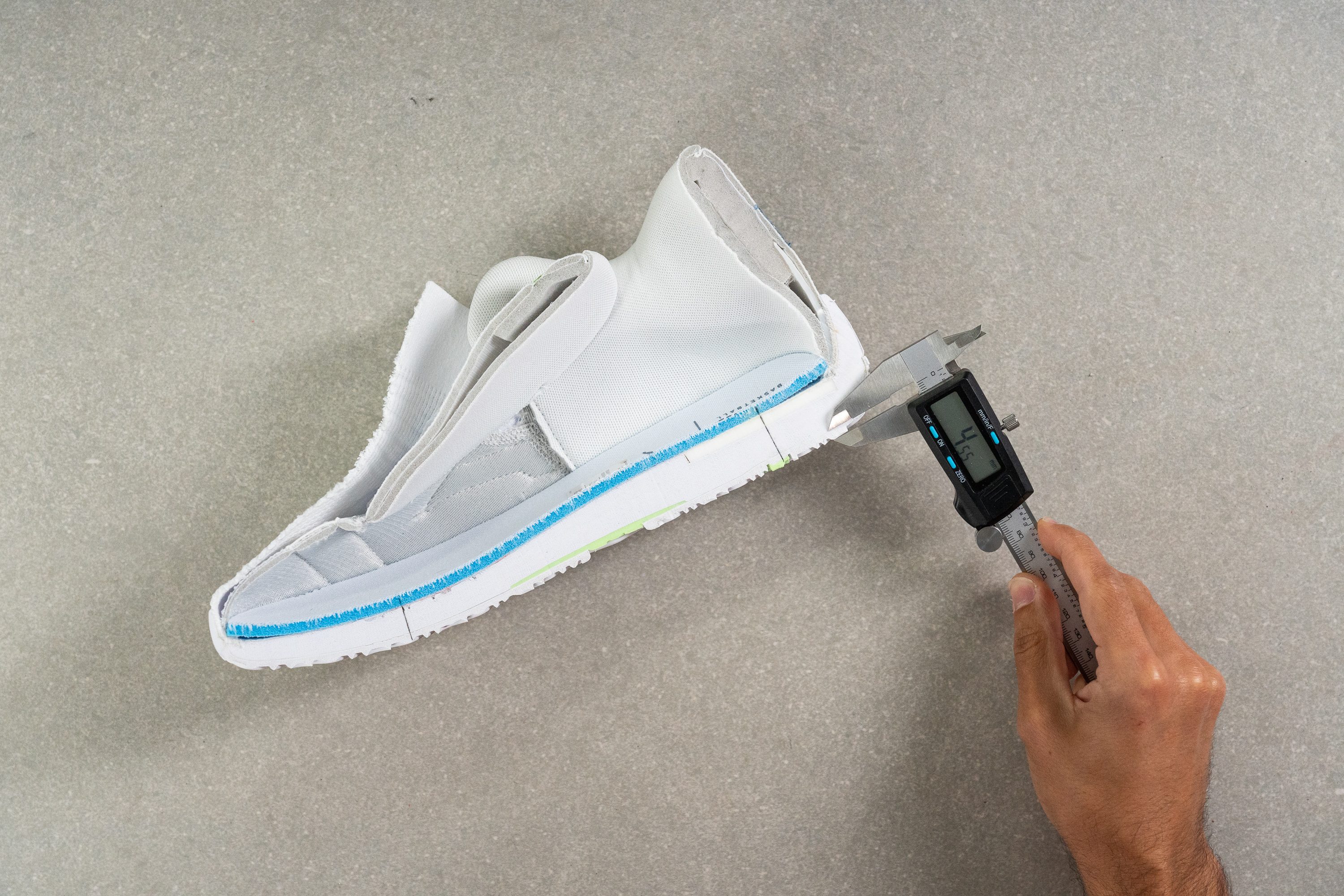
But we honestly don't think that this is going to help make the shoe more durable for outdoors. The grooves making up the shoe's tread pattern are quite thin too.
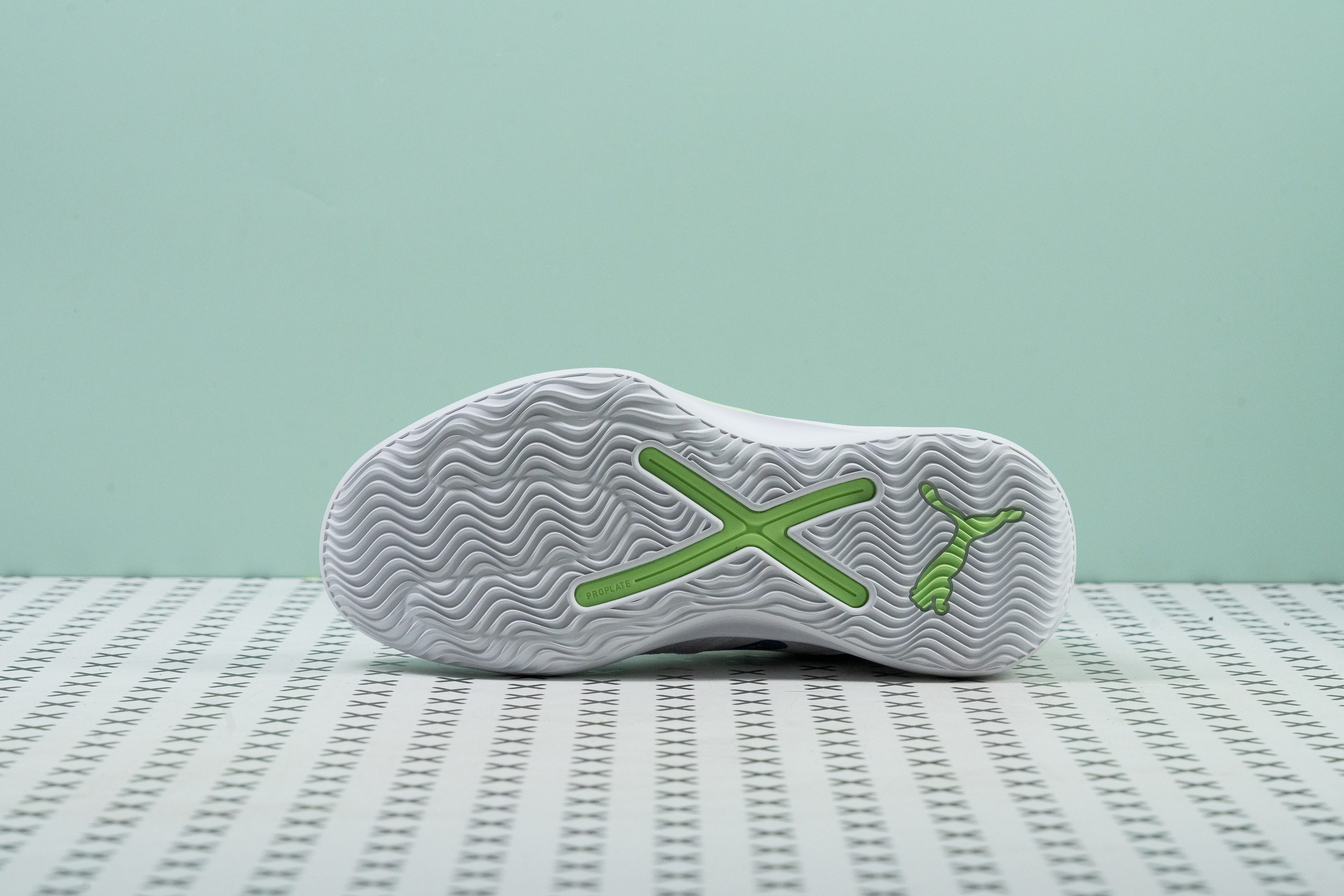
| Rise Nitro | 4.6 mm |
| Average | 4.0 mm |
Misc
Insole thickness
For added cushioning, the PUMA Rise Nitro features a well-padded insole. Measuring its thickness with a calliper, we found it to be 4.9 mm thick. This is a little thicker than average.
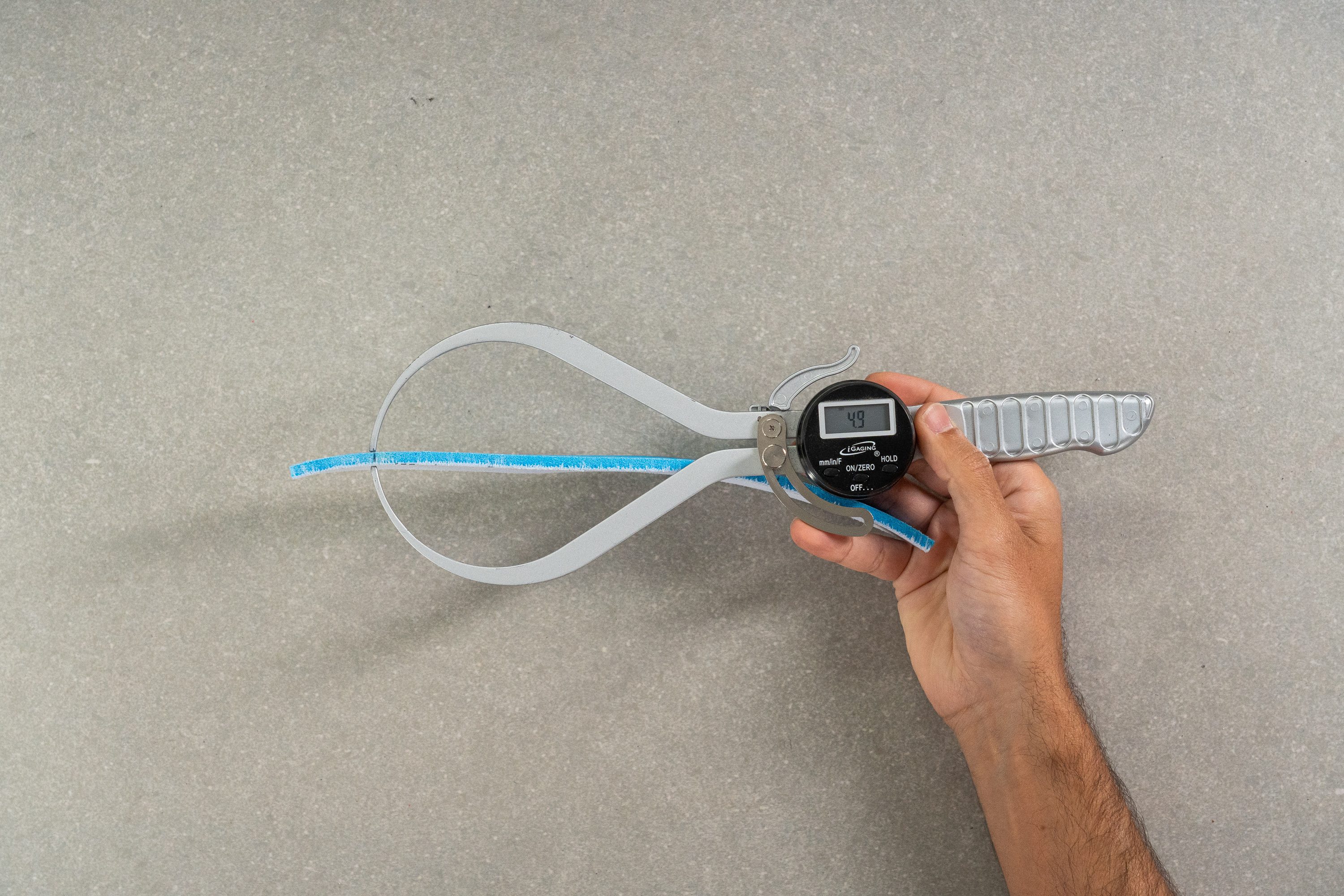
| Rise Nitro | 4.9 mm |
| Average | 4.9 mm |
Removable insole
The insole is super easy to take out in the PUMA Rise Nitro. The shoe accommodates custom inserts and orthotics.
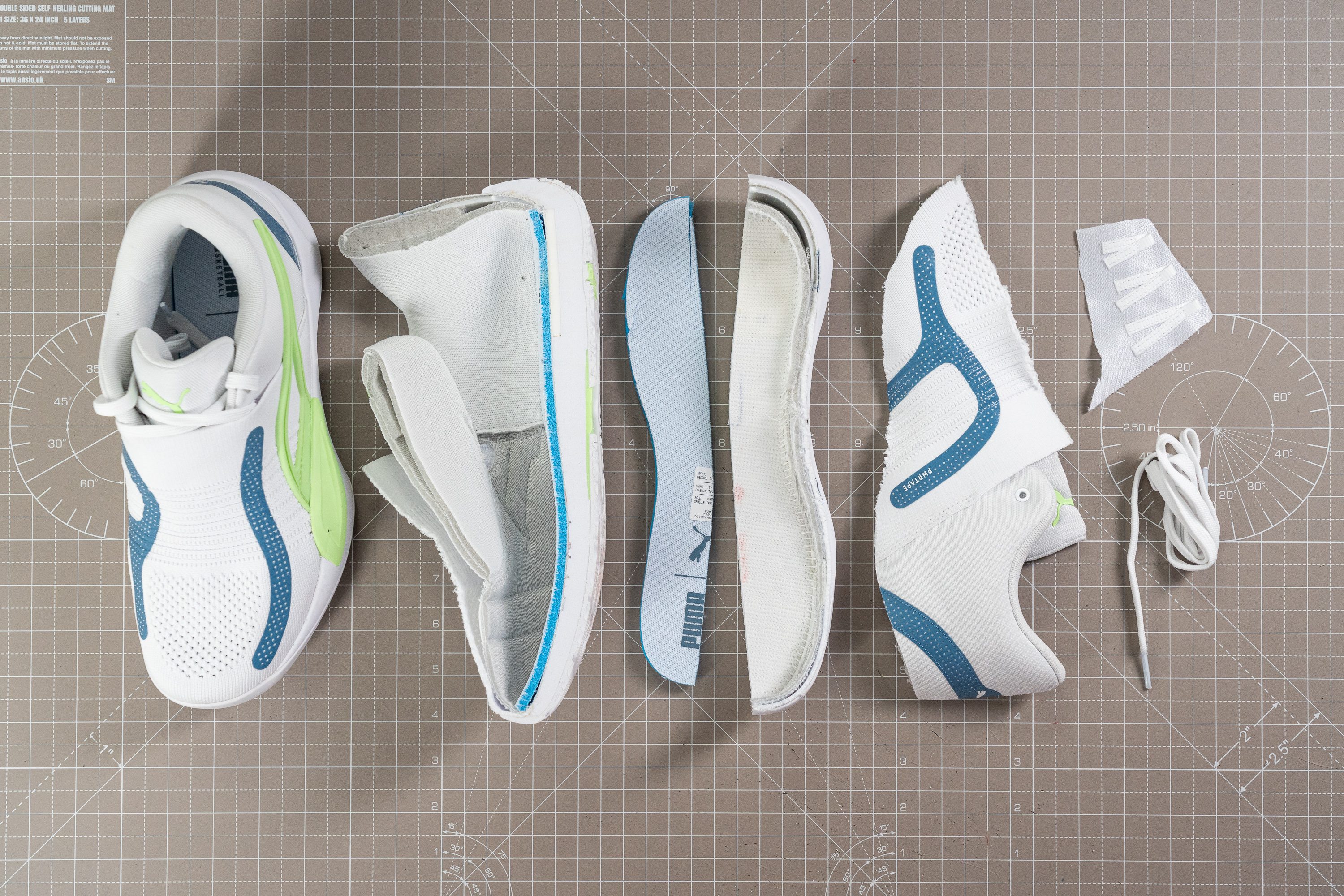
| Rise Nitro | Yes |
Tongue padding
With a thickness of 11.2 mm, we found that the tongue is extra padded in the PUMA Rise Nitro. It works together with the generous collar padding to provide a super cosy and secure in-shoe experience.
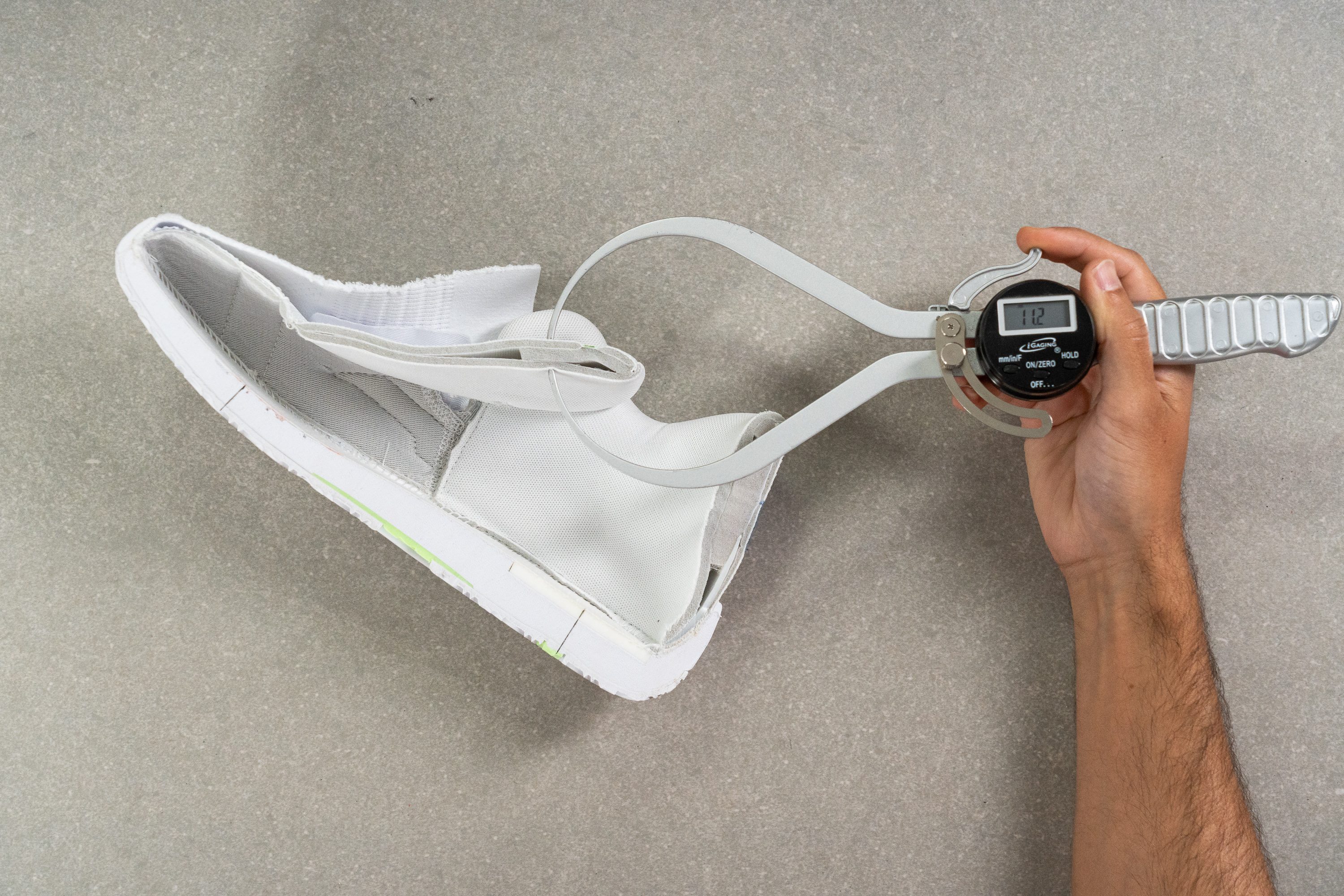
| Rise Nitro | 11.2 mm |
| Average | 9.3 mm |
Tongue: gusset type
The shoe's gusseted tongue is a very welcome feature. We felt like it added an extra layer of foot lockdown.
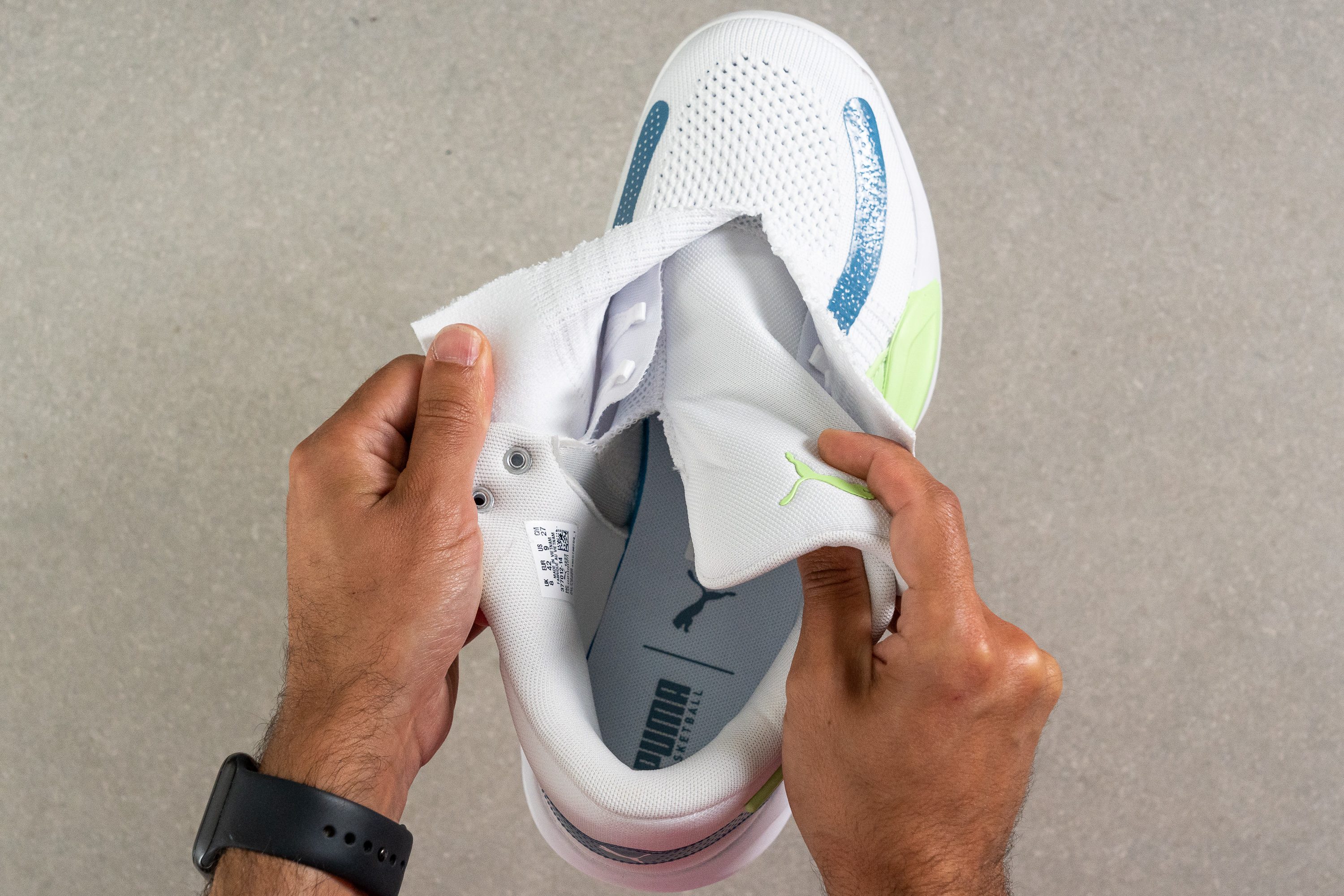
| Rise Nitro | Both sides (full) |
Heel tab
Heel tabs were not added to this PUMA shoe, so it takes a little bit of finger action to get it on.
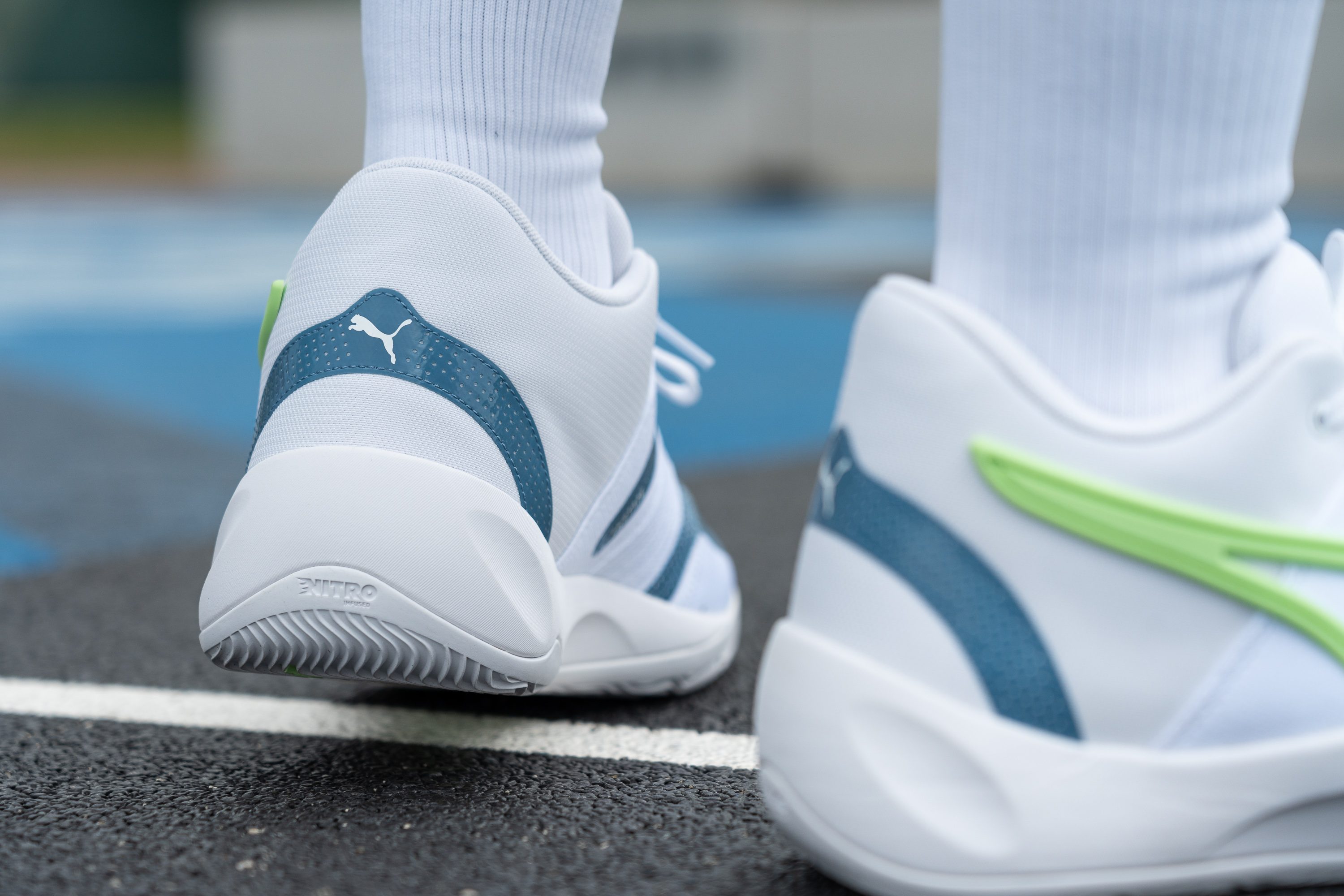
| Rise Nitro | None |

